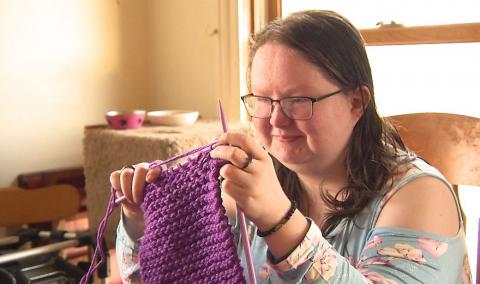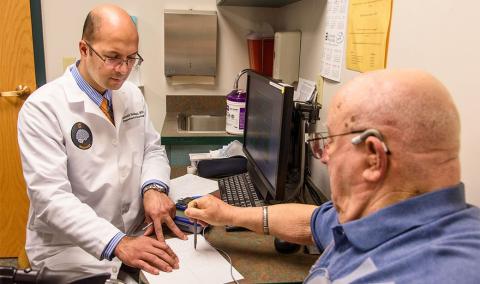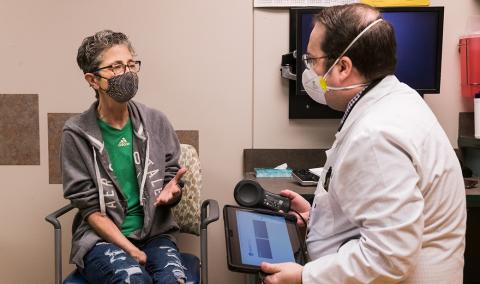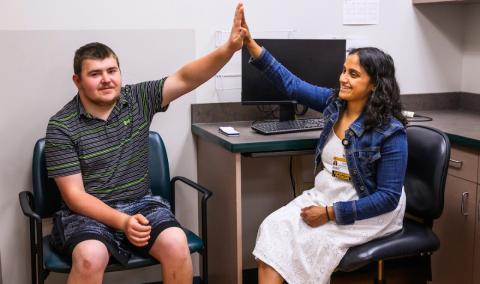Multiple Sclerosis (MS) is a disease for which no known cure is currently available, and that is why you want to see a neurologist who has been specially trained in managing the symptoms. At University of Missouri Health Care, our neurologists work with you to improve function and mobility in addition to managing your MS. Our goal is to help you regain control of your life.
What are the symptoms of MS?
The symptoms of MS are multiple and complex. They may be mild or severe, of long duration or short. They may appear in various combinations, depending on the area of the nervous system affected. The following are the most common symptoms of MS. Each individual may experience symptoms differently. Initial symptoms of MS include:
- Blurred or double vision
- Difficulty walking
- Pain and loss of vision due to an inflammation of the optic nerve
- Paresthesia - abnormal sensation, or pain, such as numbness, prickling, or "pins and needles"
- Red-green color distortion.
Throughout the course of the illness, an individual may experience any/all of the following symptoms, to a varying degree:
- Bowel and bladder disturbances
- Changes in sexual function
- Difficulty with coordination (impaired walking or standing may result; partial or complete paralysis is possible)
- Dizziness
- Depression
- Fatigue (this may be triggered by physical activity, but may subside with rest; constant, persistent fatigue is possible)
- Hearing loss
- Loss of sensation
- Muscle weakness in the extremities
- Spasticity - the involuntary increased tone of muscles leading to stiffness and spasms.
- Speech impediments
- Tremor
Approximately 50 percent of all people with MS experience cognitive impairments related to their disease. The effects of these impairments may be mild, often detectable only after comprehensive testing, and may include difficulty with any/all of the following:
- Attention
- Concentration
- Memory
- Poor judgment
Treatment you can trust
Multiple sclerosis (MS) symptoms can be unpredictable. It can make you feel helpless. But we can help you regain control. The neurosciences experts at MU Health Care have advanced experience in multiple sclerosis treatments. We can help you improve your quality of life.
We understand you want a care team that’s on the leading-edge of MS research and care. You’ll find them right here at MU Health Care. As an academic health system, the neurology experts who treat you are also leading research and teaching the next generation of experts. Our experts remain up-to-date on the latest advances in MS care and are on the front lines of new therapy discoveries.
Find help for MS symptoms
Your care team includes neurologists, neuropsychologists (psychologists who specialize in brain disorders and behavior), nurses, rehabilitation specialists and other experts. We’ll provide a personalized treatment plan to help improve your function, abilities and emotional well-being based on what’s important to you.
We use a variety of therapies to improve MS symptoms including:
- Assistive technologies (adaptive technologies). Products, tools and devices can help you stay independent. Canes, special utensils, video communication systems and mechanical lifts for your home can help make your life easier.
- Cognitive assistance. Many people with MS have cognitive (brain) problems, such as trouble with attention, concentration, memory and judgment. Our neuropsychologists help you learn ways to improve memory, learning and thinking.
- Emotional support. Coping with MS is difficult, but you’re not alone. Our behavioral health clinicians (psychologists, psychiatrists and counselors) can help you with depression, anxiety and other challenges that occur while adjusting to MS.
- Medicines. Your doctor may use medications to ease symptoms and slow down disease progression. Our experts are well versed with latest of MS treatments and our hospital and staff are trained in latest infusion treatments for MS.
- Rehabilitation therapy. Physical therapy (PT) helps you improve balance and physical conditioning. Occupational therapy (OT) helps you learn how to use devices to make everyday tasks easier. OT can also help you with speech and communication skills.
Your care team will help coordinate care, services and resources based on you and your family’s needs. We want to make your experience as convenient and stress-free as possible.
The Multiple Sclerosis Institute offers support
We understand the challenges of living with MS affect you and your loved ones. The Multiple Sclerosis Institute offers free services to help including:
- Seminars to inform you of the latest developments and treatments
- Support groups and resources for you and your family
- Help with purchasing assistive equipment
The institute also raises community awareness and supports MS research through fundraising activities. Our goal is to improve the quality of life for people and families affected by MS.



























